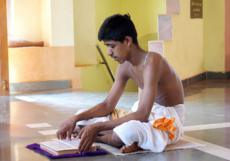Reciting Shlokas that glorify Lord Krishna can awaken the soul to eternal knowledge.
Today, as I came by bus in the morning,” reported our ethics lecturer, “a person was repeating a Shloka. What is the purpose of such muttering? What is the use of such repetition of words such as modaka hasta (with the modaka sweet in hand)? This is a silly practice.”
This statement came as a real surprise to me as I had been taught many Shlokas as a child and I enjoyed chanting them too whether I understood them or not. I did not tire from repeating them over and over again. Now, to hear a critical statement like this, that too in the Ethics period of our college life, ridiculing the central point of Vedic life was a shock to me.
EFFECT ON THE MIND

Chanting forms the basis of Vedic life. Whether in the earlier ages of fire sacrifices or the present age, chanting, either of Vedic mantras or the holy name is very important. The Vedic verses are transcendental and not made of mundane sound. Repeating these verses does not cause boredom but increases peace in the mind. The powerful effects of chanting mantras are glorified not only in the Vedic literature but also by psychological researchers of the modern period.
When we try to memorize a Shloka, it keeps reverberating in our minds, leaving no room for the devil. First it is a challenge to memorize it and when that is done, it becomes a pleasure to just keep repeating it.
A mother, memorized verses and songs as she cooked, while another learnt from a sheet stuck on the tiles of the wall as she washed the utensils. And there was another devotee that would stick up the Shloka on the front part of his motor bike and learn as he drove. There are devotees that would teach Shlokas over the phone and I am sure devotees eager to keep their minds busy with transcendental vibration would have found so many other ways.
Parents find unique times to teach their children Shlokas because it is difficult for most to find that solitary time to sit together and learn. Neither do children always sit in one place for long enough. One devotee would teach his children as he brought them to school, and one mother when she would bathe the children or brush their hair! Technology was put to its best use by Mother Kalindi who would record one Shloka on her mobile, put it on repeat mode and give it to her chatterbox daughter, Bhadrika. With this arrangement not only her chanting time become peaceful, it also made occasions of traveling less arduous as the Shloka learning activity put on hold Bhadrika’s endless questions.
Competitions that invite children to learn Shlokas are also extremely useful but the challenge here is in getting the child to continue chanting the Shlokas on a regular basis. Most children just go to the competition and later on forget what they learnt.
SHLOKAS COME TO OUR RESCUE
Besides filling up our minds with positive vibrations and thoughts, Shlokas also serve to remind us of helpful philosophy at difficult times. For example, after a long time, I had to undertake a journey on a public bus. Having got used to the security of private travel, the bus journey seemed very arduous. Then from within came a kind reminder, a Shloka I had learnt from the Bhagavatam:
narayana-parah sarve
na kutascana bibhyati
svargapavarga-narakesv
api tulyartha-darsinah
“A pure devotee of Narayana is never afraid of going anywhere and everywhere. For him heaven and hell are one and the same.” (SB 6.17.28)
This Shloka reminded me to stop fretting about my environment by remembering the pastimes of Lord Krishna. The purport of a Shloka can dawn on us as a realization by the mercy of the Lord during difficult moments.
This timely reminder came to me a few more times later on convincing me of the importance of memorizing Shlokas. Shlokas are a lot of information: a lot of philosophy packed into two or four cryptic liners that can expand greatly. Just like Lord Caitanya was able to render eighty-four explanations to the famous atmarama verse.
Shlokas connected to Lord Krishna occupy a very deep place in our heart, awakening the soul to its eternal knowledge. When Anand was in school, he had learnt a lot of Shlokas. Forty years later, when there was a death in the family, and there was a chanting of the Bhagavad-gita, he surprised everyone by chanting along without seeing the book. In fact, looking at the book only confused him, clashing with the depths of his memory.
THE BEST SHLOKA FOR THIS AGE
The Hare Krishna maha-mantra is the essence of all Vedic mantras and chanting it constantly is the best occupation for the mind. However, since our minds look for variety and our intellect for some mental activity, learning SHlokas helps to satisfy these needs and keeps our minds in transcendence above the material modes.
Srila Prabhupada explains: “They are not ordinary poems. Cintamani-prakara-sadmasu kalpa-vrksa-laksavrtesu surabhir abhipalayan. [Bs. 5.29]. These are not ordinary verse. These are transcendental verses: Govindam adi-purusham tam aham bhajami. So Krishna is worshiped by transcendental verses, transcendental language, Vedic language. That is transcendental language. Therefore it is called uttama-Shloka. (SB 1.8.32, Mayapur, Oct 12, 1974.)
Tarini Radha Devi Dasi is a disciple of Jayapataka Swami. She is the mother of four children, and she coordinates children’s programs in Chennai, Tamil Nadu. Contact her at tariniradha@pamho.net.
